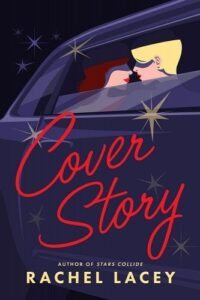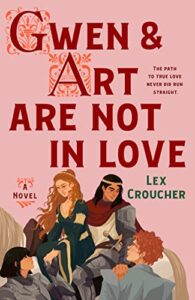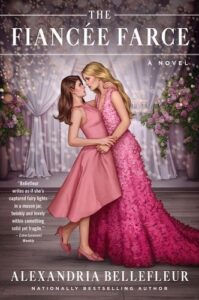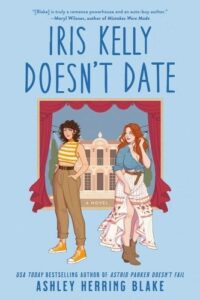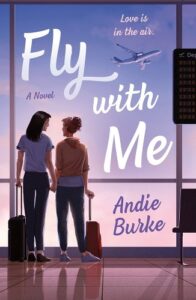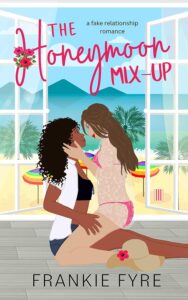Buy this from Bookshop.org to support local bookstores and the Lesbrary!
What does Rachel Lacey’s new novel Cover Story have in common with the second-highest grossing film of 1992, The Bodyguard? A lot. Or nothing at all. If you’ve seen The Bodyguard, Cover Story will definitely feel familiar. There really are only so many ways that a celebrity/bodyguard romance can go, after all.
Unlike Whitney Houston and Kevin Costner, who were both nominated for Golden Raspberry Awards for Worst Acting, Natalie Keane is going into awards season with a Golden Globe nomination for Best Actress for her performance in A Case for Love. She should be happy, but all she can think about is that the man who kidnapped her years earlier is about to be released from prison. Wanting to increase her security but not give the press a story in the process, Natalie and her team hatch the Romance Novel Plan of Plans: a fake relationship in which the fake girlfriend is a real bodyguard.
Bodyguard Taylor Vaughn, newly cleared for duty after aggressively rehabbing Chekhov’s back injury, is more than happy to take on this unconventional job. Actually, hold on for just a second. In our world, the whole “celebrity falls in love with her bodyguard” would be seen as “unconventional.” In Lacey’s world(s), or in any world where romance novel plots are real, though, a love story where sparks fly that we know the ending of all too well wouldn’t be unconventional at all, would it?
Really, think about it. One of my favorite reads of 2023 was Stars Collide, which features Taylor in the role of bodyguard to Eden Sands (who also shows up in Cover Story). As romance readers, we’ve grown accustomed to this kind of serendipity. Or kismet. Call it what you want, but think about how many things in our world would have to go just right in order for our wildest dreams to come true. As I continue to become more familiar with the genre, I’m still trying to figure out if the escapism of the romance novel is helpful or not. What I’m noticing, I think, is that the escapism of the genre pairs very well with explorations of trauma. Fortunately, that is exactly what Lacey has to offer in Cover Story.
I love author’s notes/acknowledgments that add to the novel in some meaningful way. In the Acknowledgements section for Cover Story, Lacey talks about the process of shifting the original direction of the novel to one that focuses more on safety and healing from trauma. If you’re not familiar, the 80s and most of the 90s were an interesting time for romance in films. Yes, there were plenty of romcoms, but there were also lots of romantic dramas/thrillers. The Bodyguard is, of course, one of those romantic drama/thrillers. (I had occasion to rewatch The Bodyguard not too long ago; considering that it was written in 1975 and filmed in the early 90s, the fact that it holds up at all is impressive.) It’s true that suspense can heighten a romance plot, but as a Sandra Bullock character once said, “Relationships that start under intense circumstances, they never last.”
That is certainly not the case, however, in a romance world of kismet and HEAs. Who needs reality when you have serendipity? I love The Shop Around the Corner (1940), and I have warm feelings toward both of its remakes, In the Good Old Summertime (1949) and You’ve Got Mail (1998). Maybe I’ve always had a thing for the enemies-to-lovers trope. Who doesn’t love not being able to tell the difference between bickering and banter? (If done correctly, they’re the same thing.) What makes Read Between the Lines (2021), Lacey’s updated version of this story, so rewarding, though, is how—eventually—Rosie and Jane are able to help each other overcome deeply personal obstacles. You can also see Lacey trending in this direction in her earlier Midnight in Manhattan series.
Picking up Cover Story, I knew that I was going to find a story about two people who learned to treat each other with care. That’s what Lacey does so well, and I certainly wasn’t disappointed with her newest story. (I do find myself questioning why I’m especially drawn to plots that involve celebrities like Natalie Keane and Eden Sands, but that particular exploration is best kept for another day.) One thing I do find disappointing—Lacey’s fictional movies are just that: fictional.
I’m guessing that most people know The Bodyguard for the song that Dolly Parton gave to Whitney Houston. You know…the song. What I’m trying to say is that you don’t have to listen to the A-side of the The Bodyguard soundtrack while reading Cover Story, but I certainly recommend it. You can also listen to Lacey’s own playlist for the novel. Either way, if this is your first Rachel Lacey novel, be prepared for the adorable pets.
Liv (she/her) is a trans woman, a professor of English, and a reluctant Southerner. Described (charitably) as passionate and strong-willed, she loves to talk (and talk) about popular culture, queer theory, utopias, time travel, and any other topic that she has magpied over the years. You can find her on storygraph and letterboxd @livvalentine.

